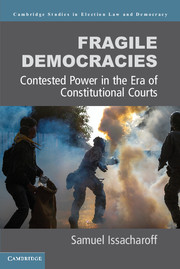Book contents
5 - Judging Militant Democracy
from PART I - MILITANT DEMOCRACY
Published online by Cambridge University Press: 05 July 2015
Summary
Extremist groups threaten democracy in terms of both what they might try to do through elections and governmental office and what they might provoke democratic societies to do in order to ward off the perceived danger. The threat is real, from both directions. That there are antidemocratic groups trying to worm their way into governmental positions so as to undermine tolerant, pluralistic, democratic societies is not a new development. What is perhaps new is the increasing likelihood that these groups will be clerically inspired rather than driven by the messianic social visions of communism or fascism. But there is the corresponding threat of excessive intolerance. Democracy thrives on contestation, and suffers if the ambit of democratic deliberation is drawn too narrowly and if the threat to social peace is used to drive out the uncomfortable voices of dissent.
In most circumstances, efforts to silence parties by prohibition are probably ill advised. As nettlesome as the Quebec independence movement may have been for Canada, the national government's ability to channel disputes over Quebec's status through the political process and even the Supreme Court is far preferable to any attempt to drive the party underground. The relative civility and tolerance of debate in Canada, however, is unfortunately not the global norm. So the question becomes what preconditions must exist for the banning of parties or for other restrictions on political expression in the electoral arena. Here I wish to leave to the side the parties alleged to be allied with insurrectionary or regional military forces. With respect to such parties, the directness of the organizational link to unlawful activity and the immediacy of the likely harm serve as workable responses to the problems posed, at least in theory.
In the absence of direct or indirect participation in illegal or violent activity, the starting point for any discussion of the banning of political parties, political participation, or political speech should be that the presumption is in favor of freedom of political expression and association.
- Type
- Chapter
- Information
- Fragile DemocraciesContested Power in the Era of Constitutional Courts, pp. 100 - 124Publisher: Cambridge University PressPrint publication year: 2015



